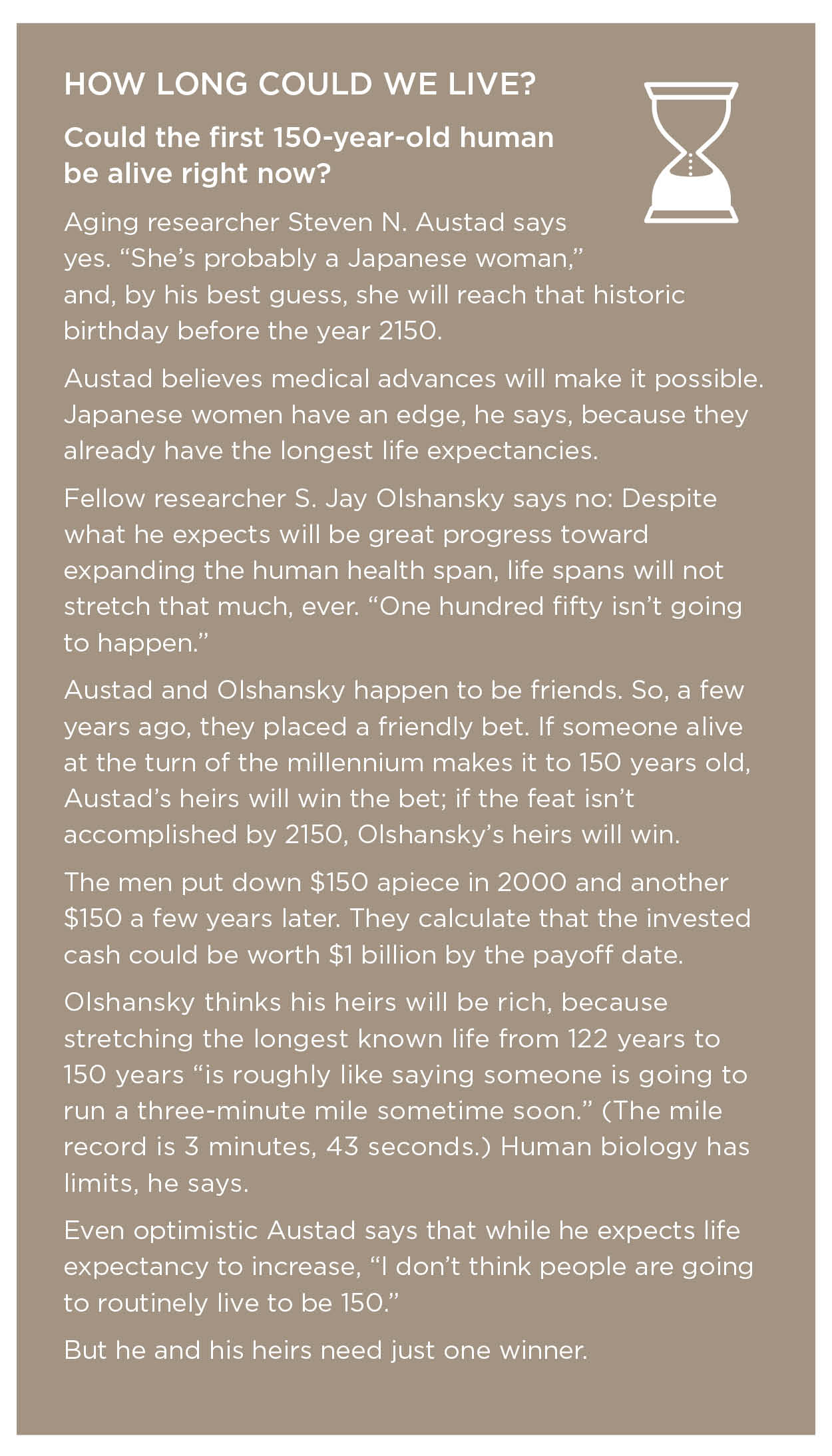Is Age Just a Number?
“There’s no question we all do not age at the same rate—just go to a high school reunion and look around,” says S. Jay Olshansky, a professor of epidemiology and biostatistics at the University of Illinois at Chicago.
Slow biological aging is what we perceive in a friend who looks younger than her chronological age. Fast biological aging is what we fear when we say stress has taken years off our lives.
In 2020, biological age is more than just a feeling—it’s a science. Researchers are developing new ways to measure it. They also are working on ways to slow it down with drugs, dietary regimens, and other approaches. They don’t expect to cure aging, “but what we’d like to do is change the rate at which that happens so that, in 20 years, you might age 10 years,” says Steven N. Austad, a distinguished professor and biology department chair at the University of Alabama at Birmingham.
We aren’t there yet, he and other researchers say. But we already know enough for all of us to take biological aging seriously and to try to do something about it while the scientists keep working on better braking systems.
Differences Start Early
Young adults often live like they are invincible, and most are outwardly pretty healthy. They are free of deep wrinkles and gray hair and have yet to develop any chronic ailments. But researchers have discovered something that might startle many young people. By their late 30s, some will be biological 60-year-olds.
That was the conclusion of a study of nearly 1,000 people born in the same New Zealand hospital in the same year. Using 18 different biomarkers—measurements that included cardiorespiratory fitness, body mass index, cholesterol counts, liver and kidney tests, immune status, and even gum health—researchers compared participants at ages 26, 32, and 38.
While most people aged about 1 year biologically for each calendar year, some aged more than twice as fast and some aged barely at all. At 38, their biological ages ranged from 28 to 61. Rapid agers felt older, according to their own health reports, and looked older, according to strangers asked to guess their ages. They also did worse on tests of physical and mental agility.
Those striking results upended the view that aging differences begin much later in life, says researcher Daniel Belsky, assistant professor of epidemiology at Columbia University.
There are a lot of studies that show about 25 percent of how healthy you remain and how long you live is due to genetics, which you can’t control. The rest is due to environment, much of which you can control.
Steven N. Austad
The differences that start in young adulthood accelerate from there. By their mid-70s, “some people are bedridden, while others are active and working,” says Eric Verdin, president and chief executive officer of the Buck Institute for Research on Aging.

“What happens when you are 70 is a reflection of things that have been happening to you throughout your life,” says Verdin.
Our bodies “are constantly subjected to stress and damage,” Verdin says. Mental and physical trauma, gravity, radiation, and other forces take a daily, invisible toll. Still, most of us manage to function well and recover from illness and injury for many decades, thanks to repair mechanisms built into our cells.
“What happens is that the repair mechanisms eventually become damaged and we get into trouble,” Verdin says.
Trouble tends to begin sooner in people with a history of stressful childhood experiences, such as poverty and abuse, according to research by Belsky and others.
Well-known health risks, such as smoking, obesity, and poor diets also speed up aging, research shows. Genes matter, but maybe not as much as people assume.
“There are a lot of studies that show about 25 percent of how healthy you remain and how long you live is due to genetics, which you can’t control,” says Austad, the Alabama researcher. “The rest is due to environment, much of which you can control.”
We can affect our aging rates, even in our 60s and beyond, Austad says, with basic healthy habits and, perhaps, some still-experimental interventions. Belsky agrees but adds, “It can be true that it’s never too late, but also be true that to get the best response, it’s best to start early.”
Testing, Testing—How Old Are You Really?
Of course, most of us don’t know our biological ages. That suggests there’s both a scientific need and a commercial market for more streamlined tests. Several have been developed.
For example, consumers have long been able to buy blood or cheek-swab tests that estimate biological age based on the length of telomeres, the protective caps at the ends of chromosomes. In studies of large groups of people, short telomeres are associated with short lives. But the measure has never been shown to accurately track individual aging rates.
“The telomere length thing was a bit of a fad,” says David Stewart, founder of a media company called Ageist. Stewart recently tried a newer kind of test.
He sent off a saliva sample to a company called Elysium Health. The company is one of several that sell tests to consumers based on epigenetic markers—chemical tags that attach to the DNA in our cells, turning genes on and off. While our genes do not change as we age, these epigenetic markers do. Certain epigenetic patterns are thought to reflect not only the ravages of time but the cumulative effects of our habits and environments. Scientists have developed aging trackers, dubbed epigenetic clocks, based on these patterns.
According to the Elysium test called Index, the 61-year-old Stewart is biologically 54. “I thought I was doing OK, but I didn’t know,” says Stewart, who swears by a low-glycemic diet, intense exercise, and plenty of sleep. “Now I know I’m doing OK. That’s a good data point.”
But consumers considering shelling out $499 should know that the test has not been reviewed or approved by the Food and Drug Administration and can’t predict longevity or the risk of any disease. The same is true of other aging tests on the market.
The test is intended to give you a snapshot of how quickly you’ve aged so far, says Morgan Levine, bioinformatics advisor for Elysium.
“It’s a readout of how you are doing, almost a report card for your health,” she says. While Levine hopes users will be inspired to maintain or add healthy habits (and take follow-up tests to track their progress), she does not have data showing that changes in health habits can alter future results.
Several other aging tests are under study. Some, used in research labs, look at blood proteins that change with age. One experimental test uses a scanner to look for signs of molecular aging in the lenses of your eyes.
Another idea: Using a computer program to analyze facial features that change with age. Olshansky, the Illinois aging researcher, is a leading promoter of that concept.
Verdin, of the Buck Institute, says he’s tried a variety of lab and photographic tests and, at age 63, consistently tests about five years younger. “I take it as a sign that I might be doing something right.”

Doing the Right Thing—and Wondering What’s Next
We all want to do the right things to slow down aging. So, what are they?
“I always tell people that we know what to do,” Verdin says. “We could gain ten years of life expectancy if everyone would start exercising, eating well, sleeping well, and managing their stress.”
Belsky agrees that such lifestyle changes “are the best prescription for healthy aging that science has today.”
Olshansky concurs, and says that exercise, in particular, is like an “oil, lube, and filter change” for your body and brain, better than any theoretical fountain of youth.
That’s not to say that scientists are not looking for new interventions. Studies of eating patterns, medications, and supplements that might affect the pace of aging are underway.
Among the experimental approaches:
Calorie restriction. Mice and worms put on very low-calorie, nutrient-dense diets have been shown to live longer, healthier lives. But humans are not mice or worms, and studies in people have yet to show longevity benefits, according the National Institute on Aging (NIA).
Fasting (also known as time-restricted eating). Some preliminary studies suggest that people who limit eating to a few hours a day or limit calories on some days each week might get some protection from age-related decline. But the evidence is not strong enough to recommend such practices, the NIA says.
Medication. Several medications appear to extend the lives of animals. One that has shown some promise in humans is an inexpensive, already-available diabetes drug called metformin. A large human trial that will look at whether metformin can delay the onset or slow the course of heart disease, cancer, and dementia in older adults without diabetes is getting underway.
Supplements. No supplement has been proven to slow down aging. That includes resveratrol, a substance found in red wine that some people take in concentrated pill form, despite a lack of safety or effectiveness data. And it includes newer supplements that promise to increase levels of nicotinamide adenine dinucleotide (NAD), a molecule important to energy metabolism that declines with age. Supplements that increase your NAD levels have not been proven to affect health or longevity.
For now, the best advice, Levine says, is “doing everything your mother told you to do.”